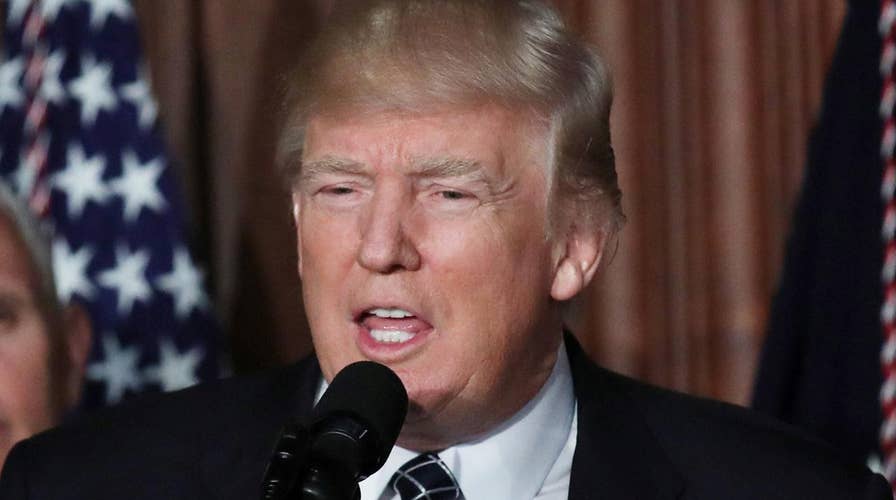Trump: We are going to start a new energy revolution
The president signs an executive order on energy
Since taking office, President Trump has looked to fulfill some of his campaign promises by using executive orders. Here are the 43 orders, actions and memoranda he has signed so far:
- An order reversing some Obama-era offshore drilling restrictions and ordering a review of limits on drilling locations.
- A memo ordering an investigation into whether aluminum imports are hurting national security.
- An order meant to improve accountability and whistleblower protections for Veterans Affairs employees.
- An order directing a review of national monument designations under prior administrations.
- An order meant to affirm local control of school policies, and examine certain Department of Education regulations and guidance to determine their compliance with federal law.
- An order directing a task force to review regulations affecting the agriculture industry.
- An order and two memoranda empowering Treasury Secretary Mnuchin to move toward tax reform and end portions of the Dodd-Frank financial reform.
- A memo ordering an investigation into whether foreign steel is hurting national security.
- An order directing federal agencies to review the use of the H-1B visa program.Two orders on trade; one requesting the Commerce Dept. report on the factors behind the trade deficit and another seeking to increase collection of duties on imports.
- An order establishing the President’s Commission on Combating Drug Addiction and the Opioid Crisis.
- An order initiating a review of the Clean Power Plan, which restricted greenhouse gas emissions at coal-fired power plants.
- An order revoking Obama-era executive orders on federal contracting.
- An order directing a top-to-bottom audit of the Executive Branch.
- A revised order suspending the refugee program and entry to the U.S. for travelers from several mostly Muslim countries, in response to objections from courts. As before, the order will suspend refugee entries for 120 days, but doesn't suspend Syrian refugees indefinitely and no longer includes Iraq in the named countries. In signing this order, the original one was revoked.
- An order moving the HBCU (Historically Black College and Universities) offices back from the Department of Education to the White House.
- An order requiring every agency to establish a Regulatory Reform Task Force to evaluate regulations and recommend rules for repeal or modification.
- Three orders establishing three Department of Justice task forces to fight drug cartels, reduce violent crime and reduce attacks against police.
- An order directing the Treasury secretary to review the 2010 Dodd-Frank financial regulatory law.
- A memorandum instructing the Labor Department to delay implementing an Obama rule requiring financial professionals who are giving advice on retirement, and who charge commissions, to put their client's interests first.
- An order instructing agencies that whenever they introduce a regulation, they must first abolish two others.
- A memorandum to restructure the National Security Council and the Homeland Security Council.
- A memorandum directing the Secretary of Defense to draw up a plan within 30 days to defeat ISIS.
- An order to lengthen the ban on administration officials working as lobbyists. There is now a 5 year-ban on officials becoming lobbyists after they leave government, and a lifetime ban on White House officials lobbying on behalf of a foreign government.
- An executive order imposing a 120-day suspension of the refugee program and a 90-day ban on travel to the U.S. from citizens of seven terror hot spots: Iraq, Iran, Syria, Libya, Yemen, Somalia and Sudan.
- Two multi-pronged orders on border security and immigration enforcement including: the authorization of a U.S.-Mexico border wall; the stripping of federal grant money to sanctuary cities; hiring 5,000 more Border Patrol agents; ending “catch-and-release” policies for illegal immigrants; and reinstating local and state immigration enforcement partnerships.
- A memorandum calling for a 30-day review of military readiness.
- Two orders reviving the Keystone XL pipeline and Dakota Access piplines. He also signed three other related orders that would: expedite the environmental permitting process for infrastructure projects related to the pipelines; direct the Commerce Department to streamline the manufacturing permitting process; and give the Commerce Department 180 days to maximize the use of U.S. steel in the pipeline.
- An order to reinstate the so-called "Mexico City Policy" – a ban on federal funds to international groups that perform abortions or lobby to legalize or promote abortion. The policy was instituted in 1984 by President Reagan, but has gone into and out of effect depending on the party in power in the White House.
- A notice that the U.S. will begin withdrawing from the Trans-Pacific Partnership trade deal. Trump called the order "a great thing for the American worker.
- An order imposing a hiring freeze for some federal government workers as a way to shrink the size of government. This excludes the military, as Trump noted at the signing.
- An order that directs federal agencies to ease the “regulatory burdens” of ObamaCare. It orders agencies to “waive, defer, grant exemptions from, or delay the implementation of any provision or requirement” of ObamaCare that imposes a “fiscal burden on any State or a cost, fee, tax, penalty, or regulatory burden on individuals, families, healthcare providers, health insurers, patients, recipients of healthcare services, purchasers of health insurance, or makers of medical devices, products, or medications.”













































